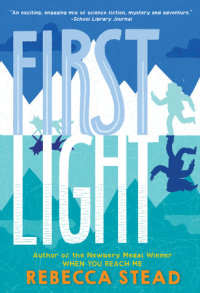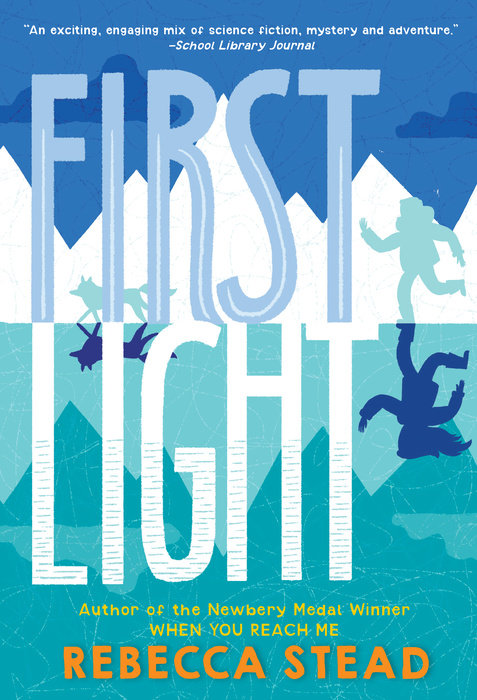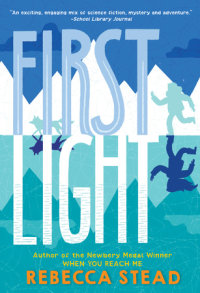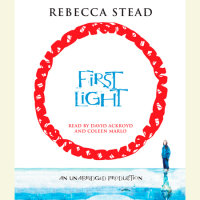First Light
This remarkable and acclaimed debut novel, by the Newbery-winning author of When You Reach Me and the new instant classic The List of Things That Will Not Change, introduces readers to a captivating, hidden world below the ice.
Peter is thrilled to join his parents on an expedition to Greenland. But when they finally reach the ice cap, he struggles to understand a series of frightening yet enticing visions.
Thea has never seen the sun. Her extraordinary people, suspected of witchcraft and nearly driven to extinction, have retreated to a secret world they’ve built deep inside the arctic ice.
As Thea dreams of a path to Earth’s surface, Peter’s search for answers brings him ever closer to her hidden home in this dazzling tale of mystery, science, and adventure at the top of the world.
“A mystic thriller.” —Entertainment Weekly
“Optimistic science fiction that highlights human ingenuity and survival under dire conditions.” —The Wall Street Journal
An Excerpt fromFirst Light
One
Most boys his age had never touched paper. There was little left. Paper was reserved for fine drawing and important documents. Mattias knew even before he could skate that if he were to harm any of it, if he were to crease one corner of one sheet, the consequences would be serious. But Mattias could not resist his mother’s drawing table. He loved the drawers and panels that opened almost without a sound, the bright vials of dye, the immaculate brushes on their small rack, the smooth wooden box of charcoal. And although he was a very obedient boy in almost every other way, he regularly explored the contents of the table when he found himself alone with it. Mattias knew its every measure, including the shape of the black dye stain that had dried inside one drawer before he was born. And each time he approached the table, he expected to find it exactly as he had always found it before.
Today he found something new.
It was a thick paper envelope, closed but unsealed, underneath his mother’s working sketches. Mattias unwound the string closure slowly, being careful to remember the length that should be left hanging when he tied it again. Inside was a square of paper unlike anything Mattias had ever seen. One side of the square glowed with an image in color, almost as if someone had frozen a moment in time and flattened it, capturing every detail. Even his mother, considered the most talented artist now alive, couldn’t create anything like this. Mattias turned it carefully in his hands, holding the square by its sharp corners. It was an image of two women. Sisters, he thought. And there was something else–a glowing blur behind them.
The sun.
Seven Years Later
A headache, Peter thought as he lay in bed with one arm thrown over his eyes, is something you have to experience to understand. No one can describe a headache to someone who has never had one. He rolled to one side and reached for the little spiral notebook on his night table.
Peter’s mother had gotten headaches for as long as he could remember. They sometimes lasted for days, during which she sat in the red chair next to the pull-out couch where his parents slept. She didn’t eat, or laugh, or make the “proper supper” she otherwise insisted upon. She hardly got up at all. “She’s gone away again,” his father would say. “But she’ll be back.” It happened maybe twice a year.
Everyone said how much Peter was like his mother– their skin that was nearly paper white, their all-over freckles, their wavy hair (hers dark, his blond like his father’s), even the way they sneezed (always twice), and laughed (very quietly, after one loud sort of bark). So Peter had always assumed that, like his mother, he would get headaches one day, and that, when he did, they would be headaches just like hers.
Peter paged through the worn notebook. It had his friends’ phone numbers in it, and the names of some video games he wanted if his parents ever let him get a video game, and the address of a company in Oregon that sold old radio parts for almost no money, and a bunch of other things. He flipped to the inside back cover, where he had made a series of slashes.
Just after his twelfth birthday, Peter’s mother began asking him whether he had a headache. She had never asked him that before, and he couldn’t help thinking it was strange she had to ask at all. Wouldn’t it be obvious when he had a headache? Wouldn’t he, too, sit in the living room and never smile or get hungry? But she kept asking, every week or two, always smiling carefully, as if she were expecting bad news. So they waited, together.
Peter got his first headache a few months later. He knew right away what it was, and three things surprised him about it. First, it lasted only a few hours. Second, although it hurt some, he was able to eat the same salt-and-vinegar potato chips he bought after school every day. Third, he didn’t tell his mother about it.
The only person he told was Miles. He and Miles had been in the same class every year since kindergarten. They knew everything about each other. For instance, Peter knew that Miles only pretended to hate the two stepsisters who lived uptown with Miles’s father and stepmother. The truth was that Miles liked them, and that he liked his Monday and Friday nights at his dad’s– he liked how the apartment was full of life, with friends coming and going, and teasing at dinner, and the way they always ate oranges and popcorn while they watched TV together.
And Miles knew that Peter was afraid to tell his mother about his first headache because it had brought him a little closer to knowing what he had already half-known for years: that his mother’s headaches were not headaches at all, but something else entirely. Something she didn’t want to talk about. Something like sadness.
Then Peter had more headaches. He took the stub of a pencil from where he had wedged it into the spiral of his little notebook and made a mark next to the others. He counted to himself, slowly. His ninth. In a month. He replaced the notebook on the table and rolled over so he could look through the skylight next to his bed.



